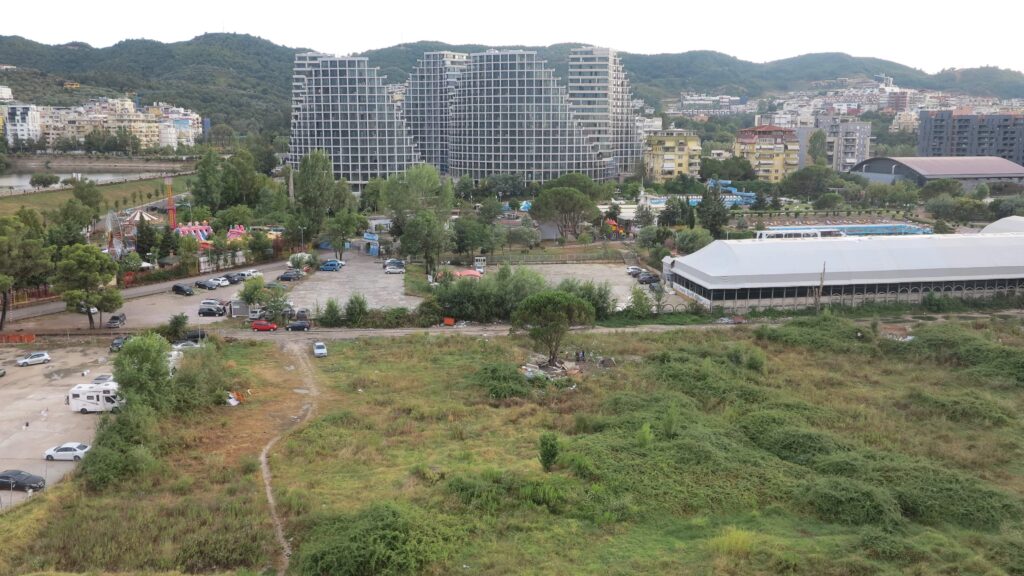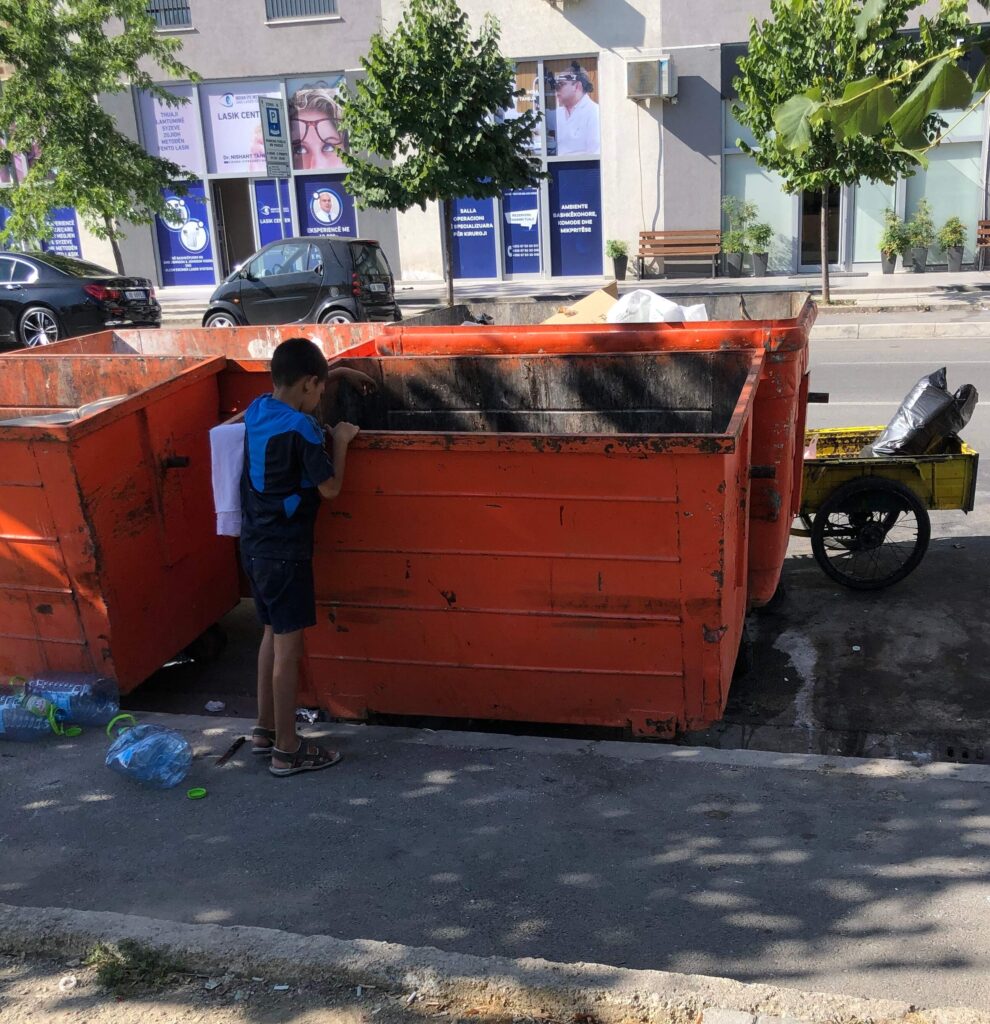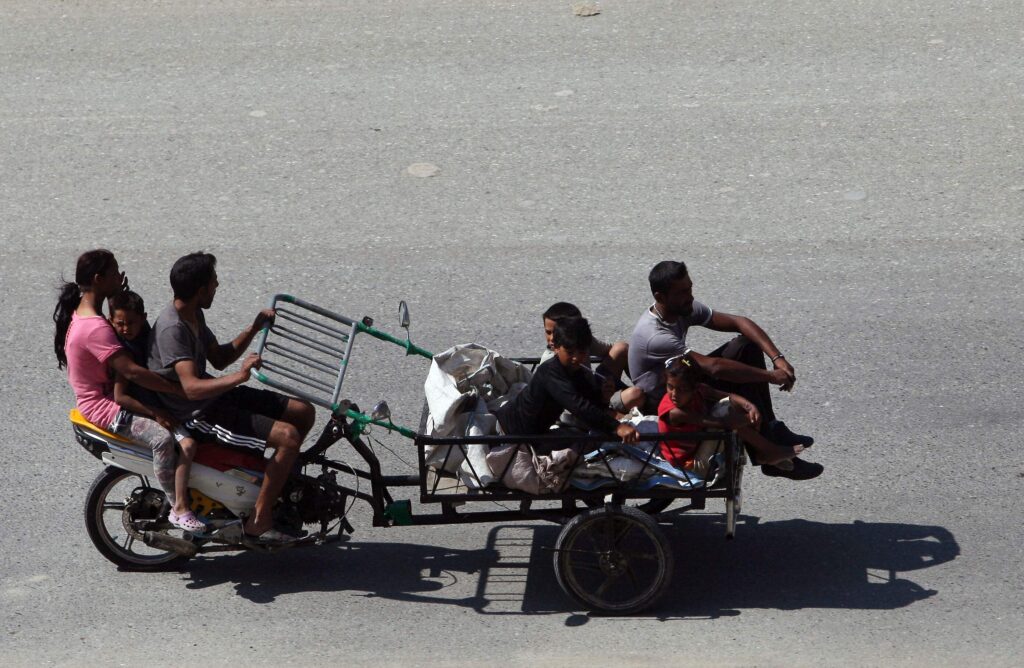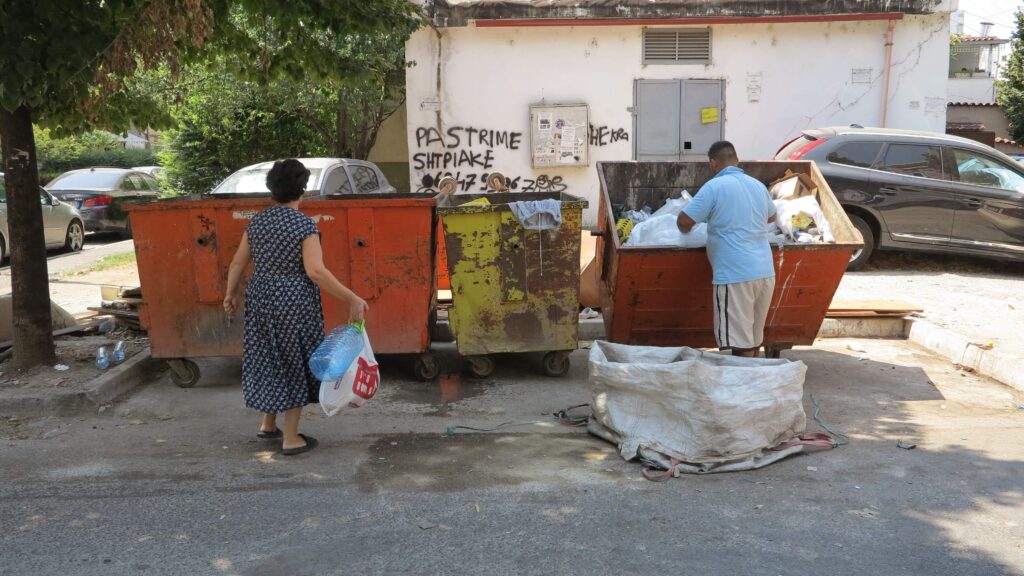Albania’s Waste Collectors and the Fight for Dignity
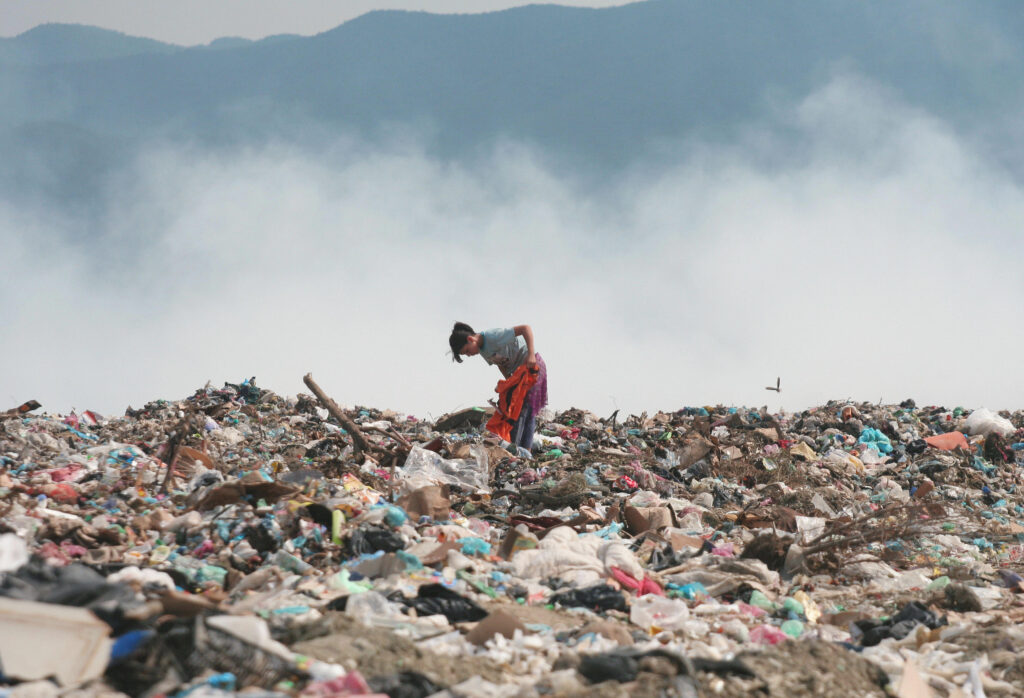
One afternoon on my way home from work in Tirana, Albania, I came across a Romani boy dragging his feet and complaining to his family walking in front of him. At first sight, it could have seemed like a normal occurrence—a teenager being forced into a family activity. Except this family was headed to pick through the trash.
“Nuk dua të mbledh kanoçe!” the boy said. (I don’t want to pick up cans.)
The interaction made me turn my head. The family’s home at the end of a barely noticeable alley looked like a make-do assemblage of brick walls and roofing sheets. But the boy would clearly rather be there. It felt unjust to see a teenager pressured into labor and a family forced into illegal work. Yet this work provides a valuable service in a country that lacks adequate recycling infrastructure.
In Albania, picking up cans is the daily reality for many Romani and Egyptian people. These communities are among the only minorities of color in a country whose borders were closed for more than 40 years, only opening to outsiders in the 1990s. Facing constant discrimination, Romani and Egyptians have few employment opportunities outside of picking through the trash for recyclables.
But in 2011, Albania passed a law deeming all garbage thrown into collection bins to be the property of each local municipality. This made it illegal for Romani and Egyptians to sort through the trash.
The plight of Romani and Egyptians in Albania provides a window into the lives of the estimated 20 million to 56 million waste pickers around the world. These informal workers are responsible for more than half of plastic recycling globally, helping to curb greenhouse gases and reduce plastic pollution in oceans. Yet in most countries, these essential workers operate in a legal gray area, and in some places their labor is illegal.
Who owns trash, and when does trash change ownership?
The experiences of these recyclers in Albania’s capital also shed light on the complicated network of people who process humanity’s 2 billion-plus tons of garbage each year, from municipal workers to the mafia to the multitudes living on the margins.
Their stories raise several vital questions: Who does garbage belong to? Who is responsible for recycling? How can waste pickers be legally integrated into the circular economy? And what happens when people turn their backs on their trash—and the people who process it?
THE ROLE OF ROMANI AND EGYPTIAN RECYCLERS
Like many places, Albania lacks a proper recycling system. The vast majority of residents do not sort recyclable materials from general household waste. Seeing how difficult trash picking is and how important it is to the environment, I decided to separate my recyclables in dedicated plastic bags. Anytime I encounter a trash picker while throwing out my garbage, I ask them if they’re looking to recycle and hand them my recycling bag. Every time, I get a sincere thank you back, sometimes from a person waist-deep in trash inside a bin.
As time has passed, I’ve gotten to know Bujari (a pseudonym), the Romani man who most regularly collects plastic and metals in the bins near my house. I frequently see him standing with his family, waiting for people to finish throwing away their trash.
I once asked Bujari if he ever thought of getting other work. He nodded his head while looking at the ground. When I inquired further, he said every time he tried to get a job, he was mistreated, so it’s better for him to work on his own. Autonomy, in whatever forms it takes, is very important for Romani communities and has helped keep their culture alive.
The communist regime that ruled Albania from 1946 to 1991 did not achieve much toward integrating Romani communities. In fact, according to scholars and many Romani people, the communist dictatorship undertook considerable unsuccessful efforts to erase Romani culture under the guise of integration.
Refusing to participate in the dictatorship’s sociocultural life, Romani and Egyptians were relegated to the impoverished margins of cities and villages, similarly to politically persecuted people of the time. Out of sight, they were ignored and demonized as thieves, witches, and generally unclean. Unfortunately, nowadays very little has been done at the institutional level to create safe spaces for these communities and to place due value on their ways of life. As gentrification increases, Romani people are forcibly relocated in an attempt to render the city “sterile.”
Because so few jobs are available for Romani and Egyptians in Albania, people often work in trash disposal and street sweeping. The latter is regulated, and street sweepers are paid a minimum wage salary. But waste pickers are much more vulnerable. That’s partly because they depend on others’ trash. It’s also in part because handpicking undifferentiated garbage has reinforced stereotypes about their bodies spreading disease.
And it’s largely because their work has been made illegal.
THE MESS CREATED BY A GARBAGE LAW
For many years, Albania has engaged in nationwide reforms as part of its application for European Union candidate country status. As a result, Albanian entrepreneurs assumed the country would start recycling, especially in the face of catastrophic climate change. To prepare for the anticipated shift, businesspeople built private plants for recycling plastic and metals.
In addition, as a prospective member of the EU, Albania must adopt a legal framework similar to that of EU countries and enforce EU-style laws. But there were concerns that Albanian recycling plants were importing trash from the Italian mafia.
Though the government at the time dismissed these claims, the concerns were legitimate. Italy is just a ferry ride away, across the Adriatic Sea, from Albania. And organized crime does have its hands in garbage management around the world. After all, the industry is legal, lucrative, and easy to get into. It’s also often overlooked. People don’t want to think about their trash, which makes garbage processing prone to corruption and human rights issues.
Due to outside pressure to prevent the mafia from sending trash to Albania, the country passed a 2011 law that regulated garbage processing and recycling, and deemed trash the property of each municipality. The government eventually decided not to implement a countrywide recycling program. Instead, it invested in three incinerators that would burn landfill waste. But the plants were never built, and the only thing burned up was Albanians’ money.
The incinerator initiative turned out to be a corrupt affair that purportedly funnels hundreds of millions of euros of Albanian taxpayer money into sketchy companies with Panamanian accounts. The then-minister of the environment was put in prison. The then-minister of finance accused the prime minister of having ties to the mafia and is now thought to be residing in Switzerland.
As a result of the government’s mismanagement and corruption, today only 10 to 18 percent of Albania’s municipal waste is collected for recycling. Most of that work is done by Romani and Egyptian workers. These informal recyclers contribute significantly to the country’s recycling system by collecting and selling materials to the owners of recycling plants.
Though the primary objective of the 2011 law was not to render the working conditions of waste pickers unsafe, it managed to do precisely that. Instances of police physically abusing trash pickers have circulated in the media. In some cases, the public has denounced this form of police brutality and raised issues of human rights violations.
At present, Romani and Egyptian trash collectors are not jailed. But they are at the mercy of the police, who often confiscate their daily collections and/or their means of transportation, despite the court deeming this to be indirect discrimination on the basis of financial difficulty and ethnicity.
ESSENTIAL WORK IN AN ILLEGAL SYSTEM
One day I was talking with Bujari about his work in this precarious system. He told me the best times to collect trash are early Saturday and Sunday mornings, after people have been partying. And the best place to collect is the nightlife hotspot area Bllok. But he stared at the asphalt and indicated with his expression that picking trash in such a central area is an unattainable ideal, as police forces keep trash pickers away from the tourist gaze.
Romani and Egyptian waste pickers must stay away from the prying eyes of the police. They mainly collect in neighborhoods with low traffic, in gentrifying areas where garbage overflows due to high-density building complexes with few spaces available for trash cans, in the outskirts of Tirana, and at landfills.
Amid this system, new forms of social solidarity and social norms have emerged. Bujari emphasized that it is important for him to make connections with people in the neighborhood where he collects, in case they might help him if the police show up. Residents have started to differentiate recyclables at home and dispose of them in separate bags. Wherever trash pickers place huge white sacks for plastic near trash cans, people have made it a habit to throw recyclables in them.
Though Tirana’s government doesn’t provide recycling trucks, the Romani community effectively does. I told Bujari I have seen the white truck operated by Romani people that collects the huge sacks of plastic bottles and where I have noticed it. Bujari politely switched the topic to avoid talking about an activity that exists in a legal gray area.
Despite setbacks and persecution, the amount of recycling these reclaimers participate in is astonishing. According to Bujari and other trash pickers, they typically earn about 700 to 800 Albanian Lekë (US$7.59 to US$8.68) per day for collecting more than 1,000 cans and plastic bottles.
Clearly, considerable change in all institutions in Albania is long overdue. But waste mismanagement and unfair treatment of informal recyclers is a global problem that requires rethinking the entire system.
REIMAGINING WASTE AND RECYCLING
In the 1960s, renowned anthropologist Mary Douglas tackled the issue of dirt in her book Purity and Danger: An Analysis of Concepts of Pollution and Taboo. Dirt is “matter out of place,” she wrote. When describing the Hindu caste system, she commented, “The whole system represents a body in which by the division of labor the head does the thinking and praying, and the most despised parts carry away waste matter.”
Similarly, Albanian policies consider Romani and Egyptians as people out of place. And systems that make waste picking illegal treat these essential workers as among the most despised.
Social anthropologist Patrick O’Hare provides a beautifully detailed alternative view in his book Rubbish Belongs to the Poor: Hygienic Enclosure and the Waste Commons. O’Hare profiles waste pickers at an enormous landfill in Uruguay that may imminently be enclosed. The book prompts the questions: Who owns trash, and when does trash change ownership?
O’Hare frames garbage as a commons—resources accessible to and managed by the collective for the common good. By viewing garbage as a commons, societies can reconsider our collective sense of responsibility toward waste and the vulnerable communities who process and recycle trash. Forming new shared approaches to trash disposal and recycling could inform equitable and sustainable waste management policies worldwide.
Granting municipalities ownership over garbage may be an important step in avoiding mafia infiltration in Albania. But garbage disposal could be regulated alongside implementing legal reforms that reframe garbage as a commons. In addition, the work of Romani and Egyptian recyclers could be legalized so they can enjoy safe conditions while providing a much-needed service that reduces the country’s ecological footprint.
Societies around the world must rethink trash as belonging to all of us, especially to people who are marginalized and impoverished. I believe the way to do this is by rendering visible the honest labor of waste pickers like Bujari and employing an egalitarian view that safeguards these vulnerable people and their livelihoods.































